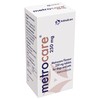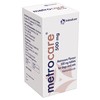Metrocare
Metrocare Flavoured Tablets for Dogs and Cats are for the treatment of gastrointestinal tract infections, and can be used for the treatment of infections of the urogenital tract, oral cavity, throat and skin caused by obligate anaerobic bacteria susceptible to metronidazole.
Metrocare are white to off-white, round and convex tablets with a cross-shaped break line on one side. They can be divided into 2 or 4 equal parts for easy and accurate dosing.
Metrocare 250mg Flavoured Tablets for Dogs and Cats
£0.30Metrocare 250mg Flavoured Tablets are indicated for the treatment of gastrointestinal tract infections caused by Giardia spp. and Clostridia spp. (i.e. C. perfringens or C. difficile )....[More info]
Metrocare 500mg Flavoured Tablets for Dogs and Cats
£0.56Metrocare 500mg Flavoured Tablets are indicated for the treatment of gastrointestinal tract infections caused by Giardia spp. and Clostridia spp. (i.e. C. perfringens or C. difficile )....[More info]
Contraindications
Do not use in cases of hepatic disorders.
Do not use in cases of hypersensitivity to the active substance or to any of the excipients.
Special warnings for each target species
None.
Special precautions for use
Special precautions for use in animals
Due to the likely variability (time, geographical) in the occurrence of metronidazole resistant bacteria, bacteriological sampling and susceptibility testing are recommended.
Whenever possible, the product should only be used based on susceptibility testing.
Official, national and regional antimicrobial policies should be taken into account when the veterinary medicinal product is used.
In very rare cases, neurological signs may occur especially after prolonged treatment with metronidazole.
Special precautions to be taken by the person administering the veterinary medicinal product to animals
Metronidazole has confirmed mutagenic and genotoxic properties in laboratory animals as well as in humans. Metronidazole is a confirmed carcinogen in laboratory animals and has possible carcinogenic effects in humans. However, there is inadequate evidence in humans for the carcinogenicity of metronidazole.
Metronidazole may be harmful for the unborn child.
Impervious gloves should be worn during administration of the product to avoid skin and hand-to-mouth contact with the product.
To avoid accidental ingestion, particularly by a child, unused part-tablets should be returned to the open blister space, inserted back into the outer packaging and kept in a safe place out of the sight and reach of children. In case of accidental ingestion, seek medical advice immediately and show the package leaflet or the label to the physician. Wash hands thoroughly after handling the tablets. Metronidazole may cause hypersensitivity reactions. In case of known hypersensitivity to metronidazole, avoid contact with the veterinary medicinal product.
Adverse reactions (frequency and seriousness)
The following adverse reactions may occur after administration of metronidazole:
vomiting, hepatotoxicity, neutropenia and neurological signs.
The frequency of adverse reactions is defined using the following convention:
-very common (more than 1 in 10 animals treated displaying adverse reaction)
-common (more than 1 but less than 10 animals in 100 animals treated)
-uncommon (more than 1 but less than 10 animals in 1,000 animals treated)
- rare (more than 1 but less than 10 animals in 10,000 animals treated)
-very rare (less than 1 animal in 10,000 animals treated, including isolated reports).
Use during pregnancy, lactation or lay
Studies in laboratory animals have shown inconsistent results with regard to teratogenic/embryotoxic effects of metronidazole. Therefore, use of this product during pregnancy is not recommended. Metronidazole is excreted in milk and use during lactation is therefore not recommended.
Interaction with other medicinal products and other forms of interaction
Metronidazole may have an inhibitory effect on the degradation of other drugs in the liver, such as phenytoin, cyclosporine and warfarin.
Cimetidine may decrease the hepatic metabolism of metronidazole resulting in increased serum concentration of metronidazole.
Phenobarbital may increase hepatic metabolism of metronidazole resulting in decreased serum concentration of metronidazole.
Amounts to be administered and administration route
For oral administration.
The recommended dose is 50 mg metronidazole per kg bodyweight per day, for 5‑7 days. The daily dose may be divided equally for twice daily administration (i.e. 25 mg/kg bodyweight twice daily).
To ensure administration of the correct dosage, bodyweight should be determined as accurately as possible.
Tablets can be divided into 2 or 4 equal parts to ensure accurate dosing. Place the tablet on a flat surface, with its scored side facing up and the convex (rounded) side facing the surface.
Halves: press down with your thumbs or fingers on both sides of the tablet.
Quarters: press down with your thumb or a finger in the middle of the tablet.
The remaining portion(s) should be given at the next administration(s).
Overdose (symptoms, emergency procedures, antidotes), if necessary
Adverse events are more likely to occur at doses and treatment durations in excess of the recommended treatment regimen. If neurological signs occur, treatment should be discontinued and the patient should be treated symptomatically.
Withdrawal period(s)
Not applicable.

